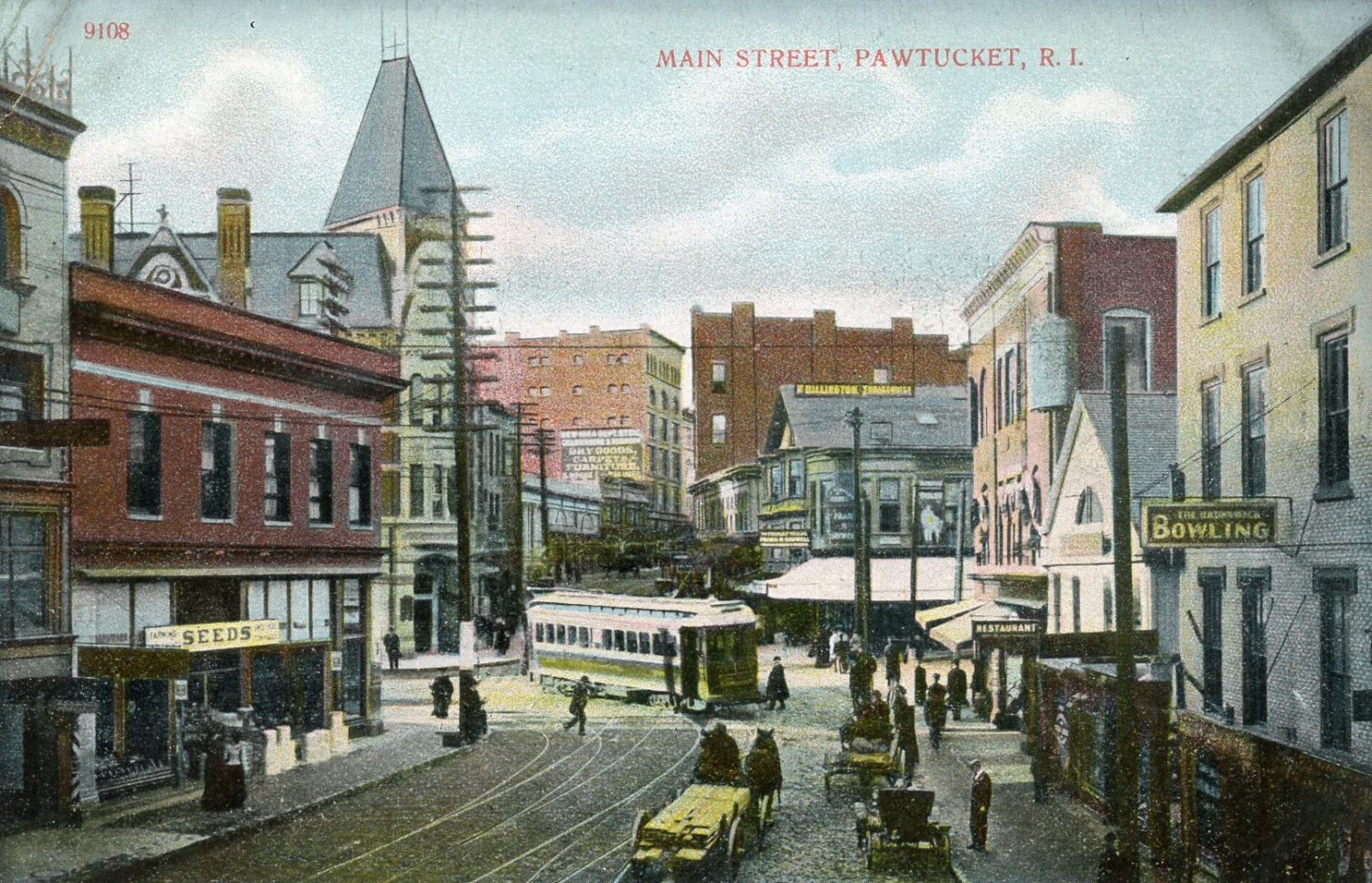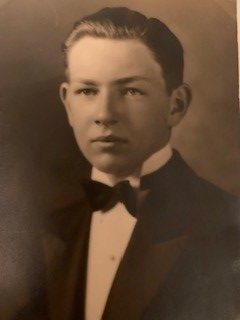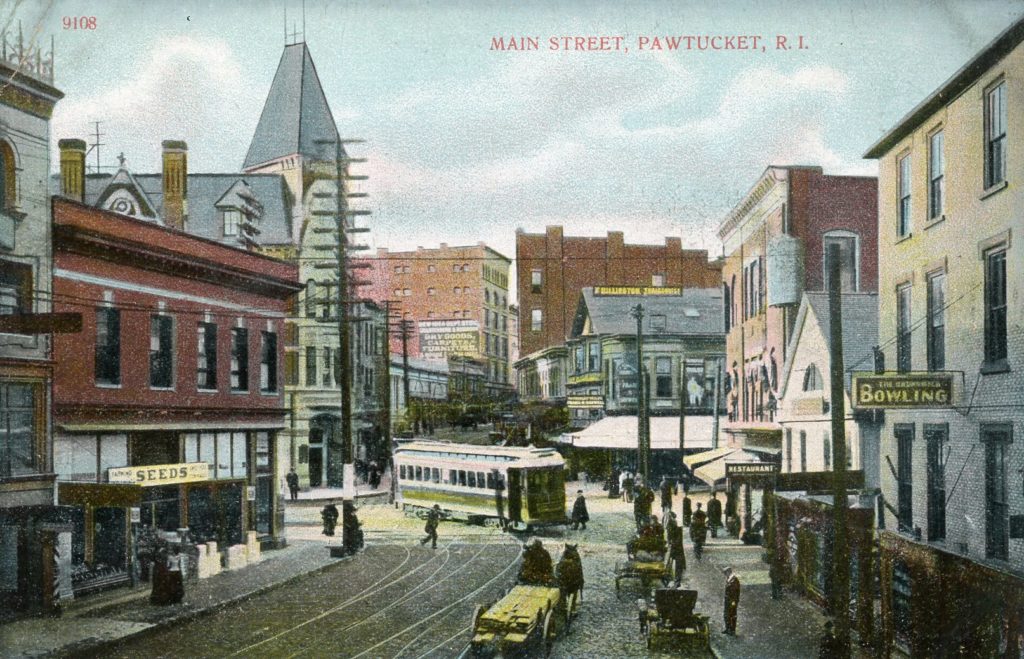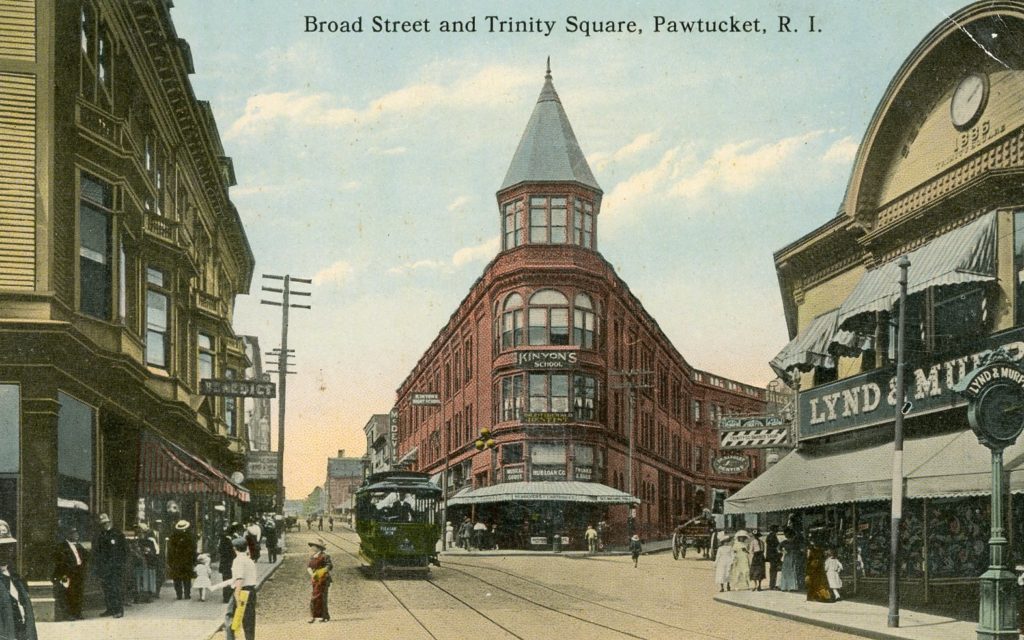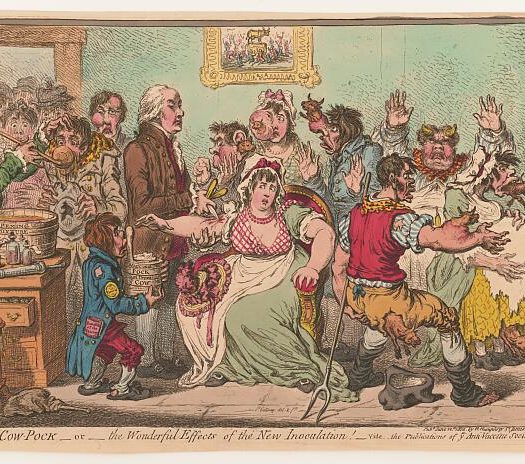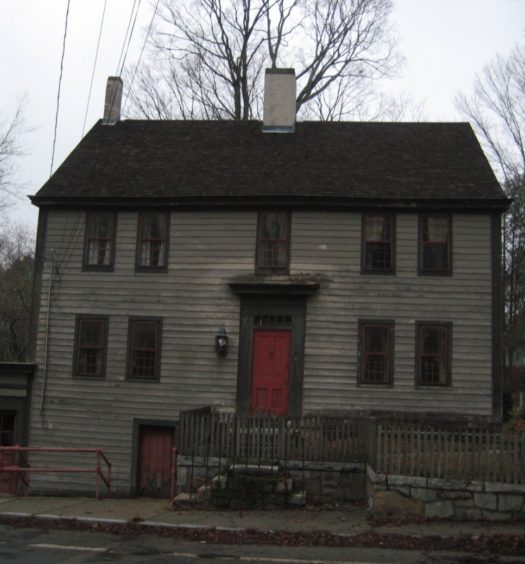The Roaring Twenties started out leisurely. The first couple of years were pretty slow, almost a recession although the country hadn’t really experienced anything it could recession from. But things began to pick up and take shape. America was making great strides in industrial production and in transportation. New products were being introduced. Radio took hold. Big bands surfaced. Jazz dazzled white folk. Short skirts and “flappers” roamed the land. It was a great time to be an American! And that include where my family and I lived, in Pawtucket.
At the start of the 1920s, my father was the general manager of a large department store in downtown Pawtucket called Shartenberg’s. However, when he took sick from tuberculosis there was no such thing as social security. You were simply out of work and out of income. He owned two houses, a six-room cottage that we lived in and the two-family house in which I had been born in 1915. Both of those flats were rented.
My father was also a member of a lot of clubs such as the Eagles, The Moose, and the Knights of Columbus. He was more than just a social drinker. Now that he was idled due to illness and at home, he decided to make his own beer, “home brew.” My brother Jim, five years older than me was appointed Brew Master. Following Dad’s directions, we went into operation in our cellar which had a laundry room with two wash tubs.
We started making the home brew in a heavy, 500-gallon cask according to Dad’s recipe. I was the Chief Bottle washer, a very responsible position in such a brewery as if even a spot of yeast remained in the bottles, it had to be thoroughly rinsed out. I used one sink for washing and the other for rinsing.
Apparently, my mom had to make other arrangements for using the sinks. I think she worked around us. In the washing process I shoved in enough BB’s in each bottle to do the trick. They came out “clean as a whistle.” Later on, I also had the responsibility of skimming off the foam in the cask that was “working” and soon helped in emptying the keg. I had a rubber hose which we called a siphon and that’s how the beer got from the keg to the bottle. I wasn’t too good at the capping, however. We worked hand in hand.
My father had a couple of friends, one named Jim and the other Bucky. They often visited Dad in the cellar. They also spent some time in a local bar room which was called a “speakeasy” in those days. The name is rather self-descriptive. There was very little noise in those days.
I forgot to mention that the Volstead Act had been passed. This act was primarily the work of the national do-gooders who were protecting the working man from the demon rum and all that that implies. Actually, I don’t really think we were going to hell in a basket, it was just that the non-drinkers didn’t want the other folk enjoying themselves. So they traded the drinkers, both social and otherwise, for tough gangsters and hoodlums. Racketeers, some of whom would eventually be known as the Mafia, now entered the lucrative business of bathtub booze and took over all alcoholic beverages.
While Dad’s friends were drinking at a rather nice local bar, they kept telling the owner how good Dad’s beer was. They bragged so much that the owner of the bar visited Dad and tried his beer. He was actually a teetotaler and ordinarily did not drink. But he knew Dad’s beer was something special and arrangements were made. He used our beer as a premium brand. So, we traded our old Hupmobile automobile for a Buick touring car with a wide and spacious trunk. It was a corker. Jim used to fill the trunk and the back seat which he covered with a black rug when he made deliveries. The policeman on our beat used to appear every evening about the same time and then was gone for the night. So we had little or no trouble, that is, until four hoodlums looked upon our “speakeasy” as a lush target.
Bucky and Jim were standing at the bar this Saturday night, probably arguing about the last striped bass they had pulled out of the Cape Cod Canal or the weight of last season’s deer. I should mention that Bucky was almost six feet tall, weighed in around 220 and had no idea of his own strength. He was standing at the bar minding his own business when the four hoods entered with pistols drawn.
“Line up against the wall with your hands up,” one commanded. The patrons scrambled to obey. All but Bucky who agreeably put his wallet on the bar, pointed it out to the nearest robber and went back to his drink. In his mind he thought it was okay. These guys wanted his wallet. They had guns. They could have his wallet. He was unprepared when the closest robber grabbed him and tired to shove him to the wall. His reaction was to whirl around and let one from his knees, whammo! As his fist hit the robber, the guys said you could hear the bones crack as he dropped to the floor and laid there motionless. One of the other robbers let off two shots into Bucky whose back was facing him. I guess he got them off too fast as both bullets hit Bucky in the fleshy part of his ass and he was back on the street, from the hospital in less than a week. He now enjoyed legendary status. I guess the robbers finished their job and two of them carried their friend out. That is the end of the story as far as I know it.
Shortly after the speakeasy incident (I almost called it a drama), we had a mid-winter thaw in the middle of February which is always our coldest month of the year. I was sitting at the kitchen table with my father while he was having his coffee. “If you could have anything you wanted this morning, what would it be” he asked. I didn’t pause for one minute….. “It’d be the Daisy Pump Action” I said. There was no hesitation, nor any thought required. This Daisy had a barrel that stored fifty BB’s in it. No reloading after every shot like the plain old Daisy’s. This gun was designed for the real expert. That afternoon a deliveryman brought us the Daisy Pump Action with twelve rolls of BB’s. Boy oh boy, what a gun! It was a veritable masterpiece.
The next morning I had to attend the Children’s Mass at 830 am at St. Leo’s Roman Catholic Church. I ran all the way home, hurriedly changed my clothes and was soon in the backyard with my gun. I had a small can which I stuck up on a fence pole in my yard and was popping at it. I hit it and it went flying. I looked up and there was my father standing in his bedroom window. He opened the window a little and hollered out to me. “Great shot,” he said, “you’re our little Buffalo Bill.”
I went into the house about a half an hour later. My mother was sitting at the table crying. She grabbed me and held me close for few minutes. Then she said, “your father just passed away. It was very peaceful.” It was almost as if she was saying it was okay since it was so peaceful.
Three days later my father was buried on a real cold February morning. It had snowed during the night and the funeral procession had trouble getting up Chaplin Street and over to the church. My father had a High Mass, which meant that there were three priests concelebrating Mass. At the cemetery we were all standing around waiting for the priest to arrive for the graveside cemetery. Someone mentioned that neither of my mother’s two closest friends were there. One was a Scotch lady, the other an English lady and the inference was that they were both Protestants. My mother just smiled. She knew what they were doing and why.
My father had been laid out in the parlor. The room was also full of flowers that people had sent, and the undertaker had taken to the cemetery. As we left our house that morning, my mother’s two friends entered through the back door. One was in charge of the house cleaning and that included opening all the windows and airing it out thoroughly. The other was brewing coffee in anything that was available. She was also setting out sandwiches and pastries. All retuning would be fed, and that schedule ran through the whole day. Had the shoe been on the other foot, my mother would have missed the funeral and been off cleaning and cooking.
I soon learned that a family is like a ship at sea. Your dad is the captain. You rely on the captain and when he is not on board you are sailing without a rudder. You are actually on your own for the rest of your life. In our case, the children were brought closer together and would remain so from then on. It made my brother and me more self-reliant. It also made us loners.
After my father’s passing, Black Tuesday was just around the corner and the Roaring Twenties were history. But a nice history. During their reign, I learned that I was an American. I had a country I could be proud of. I had the legacy of the Doughboys. It instilled in me a patriotism that would last me all my life. I knew then what I know now. If America is needed, America will be there.
I ask your forbearance as I add this sort of little postscript to this story. It concerns by BB gun. I was out in the backyard and saw a little bird land high on the top of a fairly big tree. Without even thinking I took aim and fired. Dad was right. I surely was Buffalo Bill. The little bird fluttered to the ground. When I got there, it was dead. My heart sank. He was such a beautiful little creature. I went into the house and got a match box, the kind that held about a thousand wooden matches. In those days, a household needed lots of matches. Every time one used the gas stove, one needed a match. Sparking lighters were a thing of the future. I wrapped the little bird up, put it in the matchbox and buried it. I never shot at a living thing again during my entire life. Buffalo Bill the great hunter was no longer an idol.

